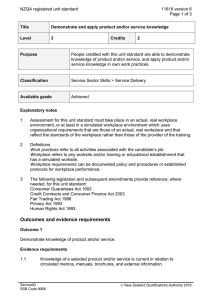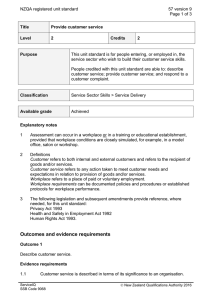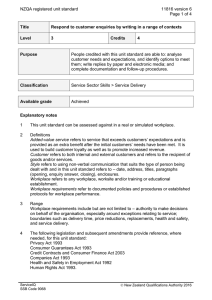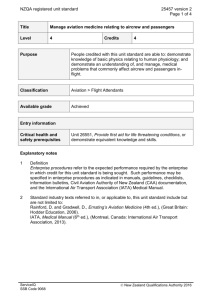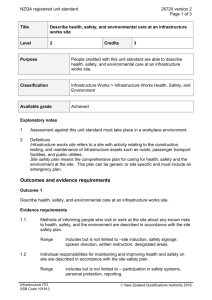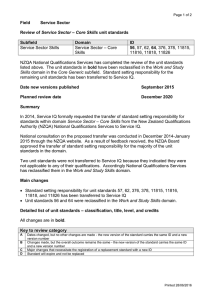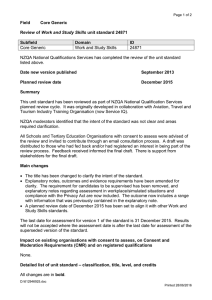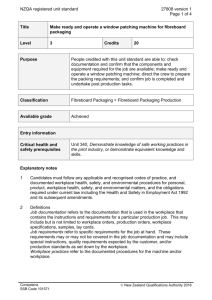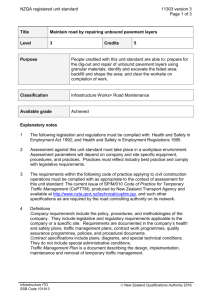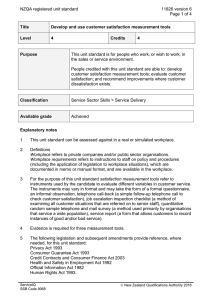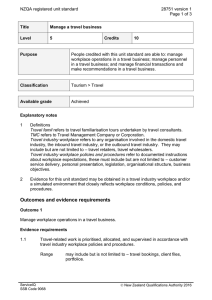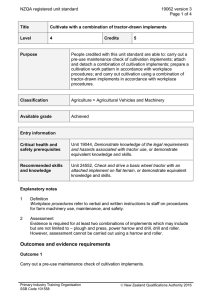NZQA registered unit standard 11815 version 6 Page 1 of 4
advertisement
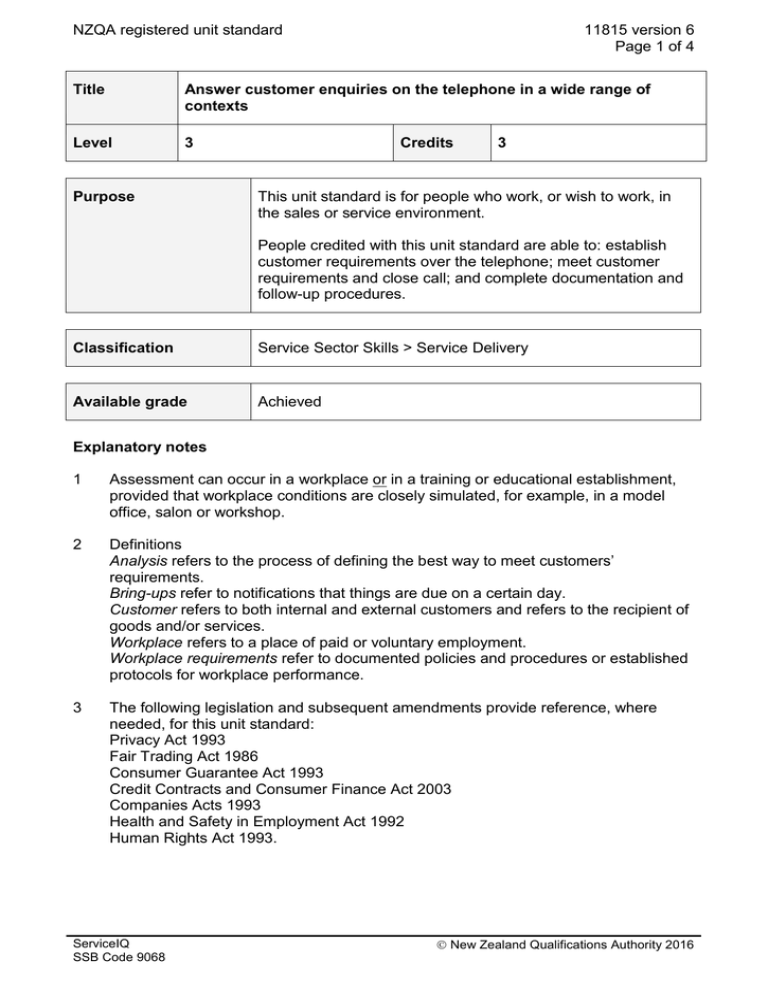
NZQA registered unit standard 11815 version 6 Page 1 of 4 Title Answer customer enquiries on the telephone in a wide range of contexts Level 3 Purpose Credits 3 This unit standard is for people who work, or wish to work, in the sales or service environment. People credited with this unit standard are able to: establish customer requirements over the telephone; meet customer requirements and close call; and complete documentation and follow-up procedures. Classification Service Sector Skills > Service Delivery Available grade Achieved Explanatory notes 1 Assessment can occur in a workplace or in a training or educational establishment, provided that workplace conditions are closely simulated, for example, in a model office, salon or workshop. 2 Definitions Analysis refers to the process of defining the best way to meet customers’ requirements. Bring-ups refer to notifications that things are due on a certain day. Customer refers to both internal and external customers and refers to the recipient of goods and/or services. Workplace refers to a place of paid or voluntary employment. Workplace requirements refer to documented policies and procedures or established protocols for workplace performance. 3 The following legislation and subsequent amendments provide reference, where needed, for this unit standard: Privacy Act 1993 Fair Trading Act 1986 Consumer Guarantee Act 1993 Credit Contracts and Consumer Finance Act 2003 Companies Acts 1993 Health and Safety in Employment Act 1992 Human Rights Act 1993. ServiceIQ SSB Code 9068 New Zealand Qualifications Authority 2016 NZQA registered unit standard 11815 version 6 Page 2 of 4 4 In this unit standard, the word agreement indicates that a course of action is: a agreed between two or more people (including the candidate) – e.g. action completed in an agreed timeframe; and/or b contained in stated policy and/or procedures (made known to the candidate) as being the required performance standard – e.g. location for filing documentation. 5 Sufficient evidence for this unit standard includes at least three enquiries. Outcomes and evidence requirements Outcome 1 Establish customer requirements over the telephone. Range examples of customer requirements may include but are not limited to – normal everyday enquiries, problem solving, enquiries outside the usual range of goods and/or service provision, multiple but linked needs, issue recognition. Evidence requirements 1.1 Call is answered and customer is greeted in accordance with workplace requirements. Range 1.2 Active listening skills are used to elicit information. Range 1.3 examples of greeting requirements may include but are not limited to – consistent welcome message, cheerful tone of voice, positive customer attitude, courtesy, timeliness. active listening may include but is not limited to – full attention, open and closed questions, clarifying, reflecting, paraphrasing, summarising, questioning, use of silence; evidence of four is required. Distressed customers are identified and action is taken to clarify their needs in accordance with workplace requirements. Range ServiceIQ SSB Code 9068 distressed customers may include but are not limited to – angry customers, sad customers, anxious customers, confused customers. New Zealand Qualifications Authority 2016 NZQA registered unit standard 11815 version 6 Page 3 of 4 Outcome 2 Meet customer requirements and close call. Evidence requirements 2.1 Customer requirements and expectations are analysed in accordance with workplace requirements. Range analysis process may include but is not limited to – information search, service boundary identification, application of service and product knowledge, application of complaint handling. 2.2 Any customer requirements outside immediate job responsibilities are referred to appropriate provider in accordance with workplace requirements. 2.3 Customer information is recorded in accordance with workplace requirements. Range 2.4 recorded information includes but is not limited to – date, enquiry, action taken, and follow-up requirements. Call is closed in accordance with workplace requirements. Range closing the call may include but is not limited to – confirmation of agreement made, farewell statement, use of customer’s name, invitation to use goods and/or services again, thanks for patronage, positive verbal and non-verbal language, next course of action. Outcome 3 Complete documentation and follow-up procedures. Evidence requirements 3.1 Documentation is completed in accordance with workplace requirements. Range 3.2 documentation may include but is not limited to – records, legal requirements, bring-ups, escalations. Follow-up is completed in accordance with workplace requirements. Range Planned review date ServiceIQ SSB Code 9068 follow-up may include but is not limited to – internal checks for progress (tracking); progress reports to customers by phone, letter, fax, or e-mail; thank you communications; apology letters for delays; promotional communication. 31 December 2020 New Zealand Qualifications Authority 2016 NZQA registered unit standard 11815 version 6 Page 4 of 4 Status information and last date for assessment for superseded versions Process Version Date Last Date for Assessment Registration 1 27 April 1998 31 December 2014 Review 2 26 September 2001 31 December 2014 Review 3 16 July 2010 31 December 2015 Revision 4 17 July 2014 31 December 2017 Review 5 17 September 2015 N/A Revision 6 21 January 2016 N/A Consent and Moderation Requirements (CMR) reference 0112 This CMR can be accessed at http://www.nzqa.govt.nz/framework/search/index.do. Please note Providers must be granted consent to assess against standards (accredited) by NZQA, before they can report credits from assessment against unit standards or deliver courses of study leading to that assessment. Industry Training Organisations must be granted consent to assess against standards by NZQA before they can register credits from assessment against unit standards. Providers and Industry Training Organisations, which have been granted consent and which are assessing against unit standards must engage with the moderation system that applies to those standards. Requirements for consent to assess and an outline of the moderation system that applies to this standard are outlined in the Consent and Moderation Requirements (CMR). The CMR also includes useful information about special requirements for organisations wishing to develop education and training programmes, such as minimum qualifications for tutors and assessors, and special resource requirements. Comments on this unit standard Please contact ServiceIQ at qualifications@serviceiq.org.nz if you wish to suggest changes to the content of this unit standard. ServiceIQ SSB Code 9068 New Zealand Qualifications Authority 2016
